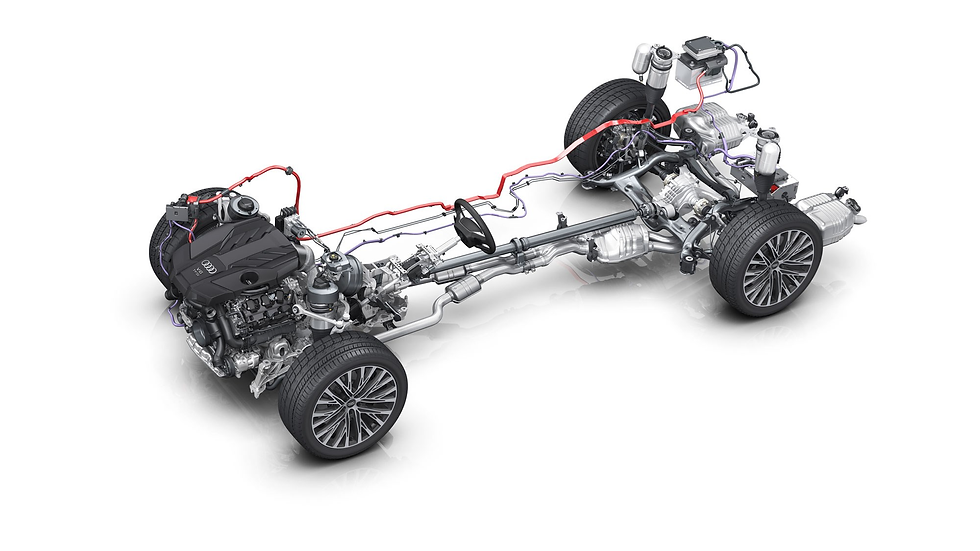The Evolution and Maintenance of Hybrid Engines
- Quality Auto & Body

- 26 jun 2024
- 5 Min. de lectura
Hybrid engines represent a significant advancement in automotive technology, blending the benefits of internal combustion engines with electric motors to create more efficient, environmentally friendly vehicles. This comprehensive guide delves into the history, technology, benefits, maintenance, and future of hybrid engines, offering a thorough understanding of how these engines work and how to keep them running optimally.
History and Development of Hybrid Engines
Early Concepts and Prototypes
The concept of hybrid engines isn't new. The first hybrid car, the Lohner-Porsche Mixte Hybrid, was developed by Ferdinand Porsche in 1901. This vehicle combined a gasoline engine with electric motors in the wheel hubs, showcasing the potential for hybrid technology even in the early days of automotive development.
Modern Hybrid Technology Emerges
Hybrid technology remained largely dormant until the late 20th century. In the 1990s, growing environmental concerns and the oil crisis prompted car manufacturers to explore alternative powertrains. Toyota's introduction of the Prius in 1997 marked a significant milestone, becoming the world's first mass-produced hybrid car. The Prius combined a gasoline engine with an electric motor and a battery pack, offering improved fuel efficiency and reduced emissions.
How Hybrid Engines Work
Basic Components
Hybrid engines consist of several key components that work together to deliver power efficiently:
Internal Combustion Engine (ICE): The traditional gasoline or diesel engine found in conventional vehicles.
Electric Motor: Provides additional power and can drive the vehicle on its own in certain conditions.
Battery Pack: Stores electrical energy for the electric motor.
Power Control Unit (PCU): Manages the flow of electricity between the battery, electric motor, and other components.
Regenerative Braking System: Captures energy during braking and converts it into electrical energy stored in the battery.
Types of Hybrid Engines
Hybrid engines come in several configurations, each with its own advantages and applications:
Series Hybrid: The electric motor is the primary drive source, and the ICE acts as a generator to charge the battery.
Parallel Hybrid: Both the ICE and electric motor can drive the vehicle, either independently or together.
Series-Parallel Hybrid: Combines features of both series and parallel hybrids, allowing for flexible operation modes depending on driving conditions.
Operation Modes
Hybrid vehicles can operate in various modes to optimize performance and efficiency:
Electric-Only Mode: The vehicle runs solely on the electric motor, using energy from the battery. This mode is typically used for low-speed driving and short distances.
Hybrid Mode: Both the ICE and electric motor work together to provide power, often during acceleration or climbing hills.
Engine-Only Mode: The ICE powers the vehicle, with the electric motor inactive. This mode is common during highway driving when the engine operates efficiently.
Regenerative Braking Mode: Energy from braking is captured and converted into electrical energy to recharge the battery.
Benefits of Hybrid Engines
Improved Fuel Efficiency
One of the primary advantages of hybrid engines is their superior fuel efficiency compared to conventional engines. By utilizing electric power for low-speed driving and assisting the ICE during acceleration, hybrids can significantly reduce fuel consumption.
Reduced Emissions
Hybrid vehicles produce fewer emissions than traditional gasoline or diesel cars. The electric motor helps lower the engine's workload, reducing the overall emissions output. This makes hybrids an environmentally friendly choice.
Cost Savings
While hybrid vehicles often have a higher upfront cost, they can save money in the long run through reduced fuel expenses and potential tax incentives or rebates. Additionally, hybrids tend to have lower maintenance costs due to less wear on the ICE.
Performance and Driving Experience
Modern hybrid engines provide a smooth and responsive driving experience. The instant torque from the electric motor enhances acceleration, while the seamless transition between power sources ensures a consistent and enjoyable ride.
Maintenance of Hybrid Engines
Regular Maintenance
Maintaining a hybrid engine involves many of the same routine tasks as a conventional engine, with some additional considerations for the hybrid components:
Oil Changes: Regular oil changes are essential for keeping the ICE in good condition. Follow the manufacturer's recommendations for oil type and change intervals.
Coolant Levels: Both the engine and battery cooling systems need to be checked and maintained to prevent overheating.
Brake Maintenance: The regenerative braking system can reduce wear on the brake pads, but regular inspections are still necessary.
Tire Care: Proper tire inflation and alignment are crucial for maintaining efficiency and performance.
Hybrid-Specific Maintenance
Battery Health: Hybrid batteries are designed to last for many years, but their performance can degrade over time. Regularly monitoring battery health and performance is crucial. Some hybrid systems include battery conditioning or reconditioning services to extend battery life.
Electric Motor and PCU: These components require minimal maintenance but should be inspected periodically for signs of wear or damage.
Regenerative Braking System: Ensure the system is functioning correctly to maximize energy recovery and maintain braking performance.
DIY Maintenance Tips
While some maintenance tasks should be left to professionals, there are several things hybrid owners can do themselves:
Monitor Dashboard Alerts: Pay attention to any warning lights or messages on the dashboard. These can indicate issues with the hybrid system that need addressing.
Keep the Battery Charged: If your hybrid has a plug-in capability, keep the battery charged to maximize electric-only driving and improve overall efficiency.
Regularly Check Fluid Levels: Ensure all fluid levels, including engine oil, coolant, and brake fluid, are within the recommended ranges.
Professional Maintenance
Hybrid vehicles should be serviced by technicians trained in hybrid technology. These professionals have the knowledge and tools to diagnose and repair hybrid-specific issues effectively. Regular visits to a qualified mechanic can help ensure your hybrid engine remains in optimal condition.
The Future of Hybrid Engines

Technological Advancements
Hybrid technology continues to evolve, with advancements aimed at improving efficiency, performance, and sustainability. Some key developments include:
Improved Battery Technology: Advances in battery technology are leading to higher energy densities, faster charging times, and longer lifespans. Solid-state batteries, for example, promise significant improvements over current lithium-ion batteries.
Enhanced Regenerative Braking: Future hybrid systems may feature more efficient regenerative braking systems, capturing more energy and further reducing reliance on the ICE.
Integration with Renewable Energy: As the adoption of renewable energy sources increases, hybrid vehicles could be integrated with smart grids, allowing for more efficient energy use and reduced environmental impact.
Market Trends
The hybrid vehicle market is expected to grow significantly in the coming years. Factors driving this growth include stricter emissions regulations, increased consumer awareness of environmental issues, and advancements in hybrid technology. Additionally, hybrid vehicles are becoming more diverse, with options ranging from compact cars to SUVs and trucks.
Hybrid vs. Electric Vehicles
While fully electric vehicles (EVs) are gaining popularity, hybrids offer a transitional technology that combines the benefits of electric and conventional vehicles. Hybrids provide a practical solution for those who are not ready to switch to a fully electric vehicle, offering improved fuel efficiency and reduced emissions without the range anxiety associated with EVs.
Conclusion
Hybrid engines represent a significant step forward in automotive technology, offering a blend of efficiency, performance, and environmental benefits. Understanding how hybrid engines work and how to maintain them is essential for hybrid vehicle owners. Regular maintenance, attention to hybrid-specific components, and professional servicing can help ensure your hybrid engine remains in optimal condition.
As hybrid technology continues to evolve, we can expect even greater improvements in efficiency, performance, and sustainability. Whether you already own a hybrid vehicle or are considering making the switch, understanding the intricacies of hybrid engines can help you make informed decisions and get the most out of this innovative technology.
By staying informed and proactive about hybrid engine maintenance, you can enjoy the benefits of hybrid driving for many years to come










Comentarios